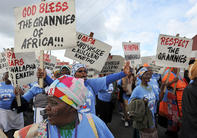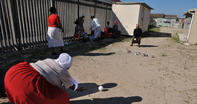‘Your Mother Must go to a Support Group’

The social worker that my daughter Phyllis was seeing told her one day, 'Bring your mother here. She must go to a support group.' At that time, Professor Monica Ferreira and others from the University of Cape Town were doing their academic research into the lives of grannies in South Africa.
The social worker told me I should get hold of them and attend the support group they were organising. This was their effort to help the grannies in return for hearing all about our lives. Well, we started our support group at the back of Michael Mapongwana Hospital in Khayelitsha, next to the police station. At the beginning there were seven grannies in that group.
Then three more came, so there were 10 of us. We each collected R10 and we opened a bank book in the name GAPA, Grandmothers Against Poverty and Aids, so we could raise more money and use it to help ourselves. We chose the name GAPA carefully, considering what our problems were.
Deciding What We Needed to Learn

As the support groups continued, we started groups in our own houses that would meet once a week, and we started recruiting other grannies. We called these 'psychosocial groups', where we did the hearing and sharing, listening to each other and telling our stories. At GAPA we also learnt about how HIV worked, and what to do when our sons and daughters come back from the hospital and tell us they are HIV-positive.
Normally in these situations we would be overcome with grief and anger but we cannot do that, because then we are no good for our children and it does not help us to cope either. We decided what we needed to learn in our workshops to help us cope with our daily lives. There have been many times, since GAPA started, when it has kept me alive and given me the strength I needed to keep going.
By Jo-Anne Smetherham